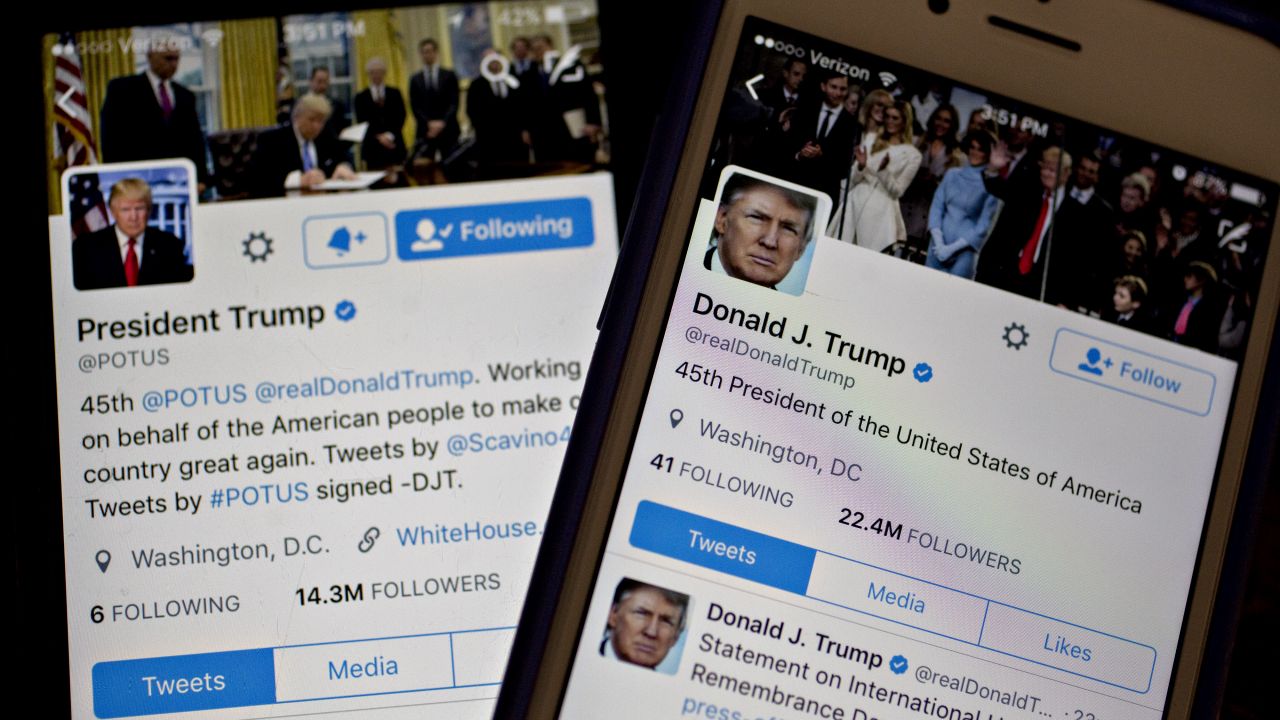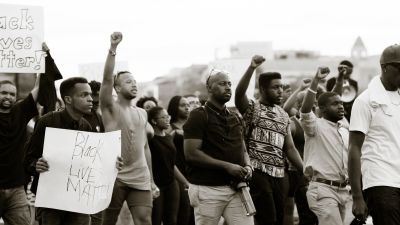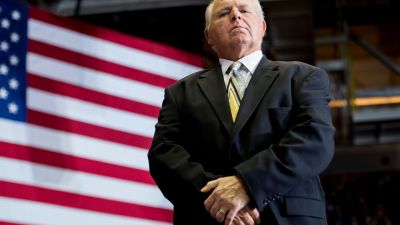
The Twitter accounts of President Donald Trump, @POTUS and @realDoanldTrump, are seen on an Apple Inc. iPhone arranged for a photograph on Friday, Jan. 27, 2017. (Photo by Andrew Harrer/Bloomberg via Getty Images)
Ralph Nader interviewed me the other day for his radio show. He wanted to know how Trump always manages to beat what he called the “broken” legal system. I don’t believe that our legal system is “broken” — only limited in what it can do.
Trump accuses talk show host Joe Scarborough of murder without the slightest bit of evidence. Nader asked me why doesn’t the legal system do something about this. He wondered why Trump wasn’t thrown in jail over the Scarborough defamation. The short answer is that we still have criminal libel statutes in 24 states, but they are rarely prosecuted. England used to have them, and their application led to Oscar Wilde’s undoing when he brought a criminal complaint against the Marquess of Queensbury, who had accused him of “posing as a sodomite.” England did away with criminal libel in 2010.
Trump hates Scarborough. Scarborough has been his inveterate critic. There is actual ill will between them. Since Scarborough is a public figure, to make a civil case of libel, he must prove not only garden-variety malice, but what lawyers call constitutional malice under the rule of New York Times v. Sullivan, where the Supreme Court saw libel actions at odds with First Amendment freedoms. Sullivan required a public official to prove actual knowledge of the falsity or reckless disregard for the truth of a defamation in order to prevail. Heavy burden, and so far Scarborough hasn’t sued. Ironically, Trump has from time to time urged his Supreme Court to overrule Sullivan. He says there are a lot of public figures he wants to sue and the Sullivan case makes it more difficult.
Trump is no stranger to libel suits against media figures. He sued the Chicago Tribune and its architecture critic in 1985 because the critic said one of his planned buildings, not even in construction, would be “an atrocious ugly monstrosity.” The court threw out the case. A critic’s opinion cannot be libelous; you need a defamatory statement of fact. In 2011, he sued journalist Tim O’Brien for $5 billion. O’Brien pointed out that Trump had overstated his net worth. The court threw that one out too.
In 2015, he sued Univision for defamation and breach of contract, seeking damages of $500 after the Spanish-language network said it would not be airing Trump’s Miss Universe beauty contests because he had referred to Mexican immigrants as “rapists.” Trump also claimed that Univision had posted an Instagram image of Trump side by side with a mass murderer and white supremacist. Trump dropped the defamation case. The breach of contract case was settled on terms that are shrouded in mystery.
In the only case I could find where Trump was sued for libel, the plaintiff was political strategist and commentator Cheri Jacobus, who had called him during the campaign a “bad debater” who “comes off like a third grader faking his way through an oral report on current affairs.” Trump retorted that Jacobus had “begged” him for a job on the campaign. He said she was “really dumb,” a “major loser” of “zero credibility,” and “virtually incompetent” with a “failed career.”
The court dismissed Jacobus’ case, citing the rule against opinions, the same rule that caused the court to throw out the Chicago Tribune case. Defamatory opinions are OK. Ideas should be fully aired. False statements of fact such as those Trump leveled at Scarborough are actionable. Ay, there’s the rub.
If anyone other than Trump published a false charge that someone committed murder, he or she would be most certainly be slapped with a multimillion-dollar libel suit, but, strangely, Scarborough has so far stayed away from bringing one. Surely such a suit would not be barred by a purported claim of presidential immunity. As I said to Nader, there are limitations to what the legal system can do, and it just cannot possibly remedy every instance of injustice.
Trump’s battle with free expression also ran afoul of social media. Trump bristled at Twitter’s response to his false mail ballot tweet and to his incendiary tweet implying that Minneapolis protesters should be shot. The first, claiming the use of mail ballots would lead to fraud, triggered a fact-check link from Twitter. They said the post violated their rules against voter suppression. Facebook has nearly identical rules, but Mark Zuckerberg of Facebook limply said he would allow the Trump post without the link.
The second Trump post, calling the protesters of an alleged murder of a black man by a white Minneapolis police officer “thugs” and threatening “when the looting starts, the shooting starts,” was described by Twitter as “glorifying violence.” Twitter required subscribers to wade through a Twitter legend before accessing the Trump tweet. Zuckerberg’s Facebook stayed on Trump’s good side and said nothing about the same post. Zuckerberg said Facebook wasn’t going to judge Trump’s posts. Twitter’s Jack Dorsey said he would hold his ground.
Trump fulminated. He announced that he would issue an executive order cracking down on social media for fact-checking. His May 28 executive order argues that Twitter selectively censors in a manner that “clearly reflects political bias” because it does not censor Adam Schiff or the Chinese Communist Party. He thereupon cited the “sacred right” to free speech established by the “Founding Fathers,” forgetting that he himself had repeatedly chilled speech, bringing libel cases against lawyers, journalists and media organizations, and that the First Amendment is a restraint on Congress, not private organizations like Twitter and Facebook.
There is another section of Trump’s executive order entitled “protections against online censorship.” This section declares the “policy of the United States” to be that social media companies should no longer have the protection of Section 230 (c)(2)(A) of the Communications Decency Act (1996) absolving them of civil liability for restrictions placed on posts. Trump’s executive order goes on to declare that the Federal Trade Commission should “consider” going after social media “deceptive practices” (last I checked, it’s supposed to be an independent agency) and directs filing of a petition with the Federal Communications Commission (another independent agency) to remove Section 230 protections if a social media company’s fact-checking is “pretextual.” Total nonsense!
None of this should have the slightest effect on the social media companies like Twitter and Facebook, although Facebook’s Zuckerberg said he would cave. The executive order is in dead odds with a statute of Congress. The Communications Decency Act authorizes social media companies to restrict access to their platforms of “excessively violent, harassing, or otherwise objectionable” material, free of liability for doing so. There, Congress granted exemption from civil liability to social media companies for restricting access “whether or not such material is constitutionally protected.”
This executive order is vintage Donald Trump, empty threats “full of sound and fury, signifying nothing.” It did not take Twitter and Facebook to the woodshed. And he could not legally do it if he ever tried. The First Amendment is also irrelevant to Trump’s railings against Twitter. It was Justice Oliver Wendell Holmes who taught us that free speech protects not just the speech Donald Trump’s government loves, but “freedom for the thought we hate.”



